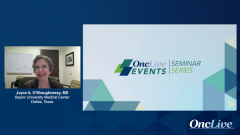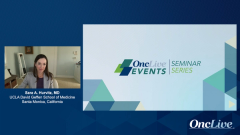
Molecular Testing Platforms in Breast Cancer
Expert perspectives on platforms for molecular testing in breast cancer, as well as the actionable targets that treating physicians should be looking for.
Episodes in this series

Transcript:
Joyce A. O'Shaughnessy, MD: Hi. Good evening, everyone. Welcome to New Frontiers in Breast Cancer Updates and Advances in Breast Cancer Treatment. I'm Joyce O'Shaughnessy from Baylor University Medical Center and Texas Oncology in Dallas, Texas. It's a great pleasure to be here with Sara Hurvitz, who is a professor of medicine and director of the breast cancer clinical trials program in the division of hematology-oncology at UCLA School of Medicine and the medical director of the clinical research unit at the Johnson Comprehensive Cancer Center, Los Angeles, California. Good to be here with you, Sarah, always a pleasure to see you.
Tonight we will go through the key data that has come out and has changed our practice recently. We'll also look towards the future, but mainly we're going to talk about new trial results that we need to incorporate into practice every day. We're going to show you the top-level results from the trials, and then we're going to go back and forth and have some conversation about how we utilize these data in our practice. Let's look at the objectives of tonight's program: We're going to talk about molecular testing and what is our current practice in patients with early-stage breast cancer; we'll talk a little bit about metastatic as well. We're going to talk about how we select neoadjuvant and adjuvant treatments for state-of-the-art care of patients with early-stage HER2-negative and triple-negative breast cancers, and we're going to turn to metastatic HER2-positive breast cancer and talk about the different options for sequencing therapies for HER2-positive metastatic breast cancer patients. Let's go ahead to the next slide where we're going to talk about starting off with what kind of molecular testing we get for early-stage and late-stage patients. I'll ask Sarah if she might start us off with what she thinks to be the standard of care and analyze what we want to test for in the early-stage setting.
Sara A. Hurvitz, MD: Absolutely, Joyce; thank you so much. It is evolving; I think we'll be discussing this this evening. I can recall when, just coming out of fellowship, the only 3 things we would check for were ERPR [estrogen receptor progesterone receptor] and HER2 [human epidermal growth factor receptor 2] when making decisions, and HER2 was relatively new, at least in the early breast cancer setting. We check for these biomarkers—the estrogen receptor, progesterone receptor, and HER2—by testing for their protein expression level on the cell surface, looking at an immunohistochemical [IHC] stain. We have guidelines through ASCO [American Society of Clinical Oncology] and the College of American Pathologists [CAP] that help us interpret these stains; they also help the pathologists know how to standardize the antibodies used, et cetera. These are important in determining the use of endocrine therapy and HER2-directed therapies. Many feel that FISH testing, or fluorescence in situ hybridization, looking at the gene copy number for HER2 is a gold standard. It has less variability than using IHC, and the ASCO-CAP guidelines help us interpret and standardize FISH testing. We now have a therapy that may be available soon for HER2-low breast cancer based on IHC 1 plus or 2 plus scores, but nonamplified HER2 breast cancer, at least in the metastatic setting. Understanding where that therapy T-DXd—trastuzumab deruxtecan—works, and if it is approved, we’ll have to look even more carefully at our IHC testing to ensure that it's standardized so we can identify all the patients who would be eligible for therapy if their tumor is HER2-low. We have gene expression tests available to us to help determine whether chemotherapy is beneficial for early-stage disease. These include tests like the 21-gene recurrence score, the 70-gene prognostic signature, and the Breast Cancer Index; and not shown on this slide, but certainly important, our genetic testing, BRCA1, and 2 tests for our patients that we have available in the early-stage setting for patients who are BRCA carriers.
Transcript edited for clarity.






































